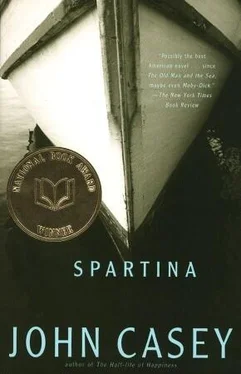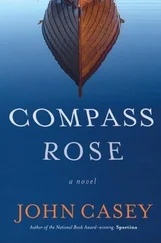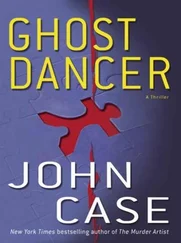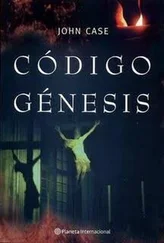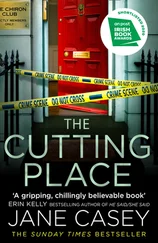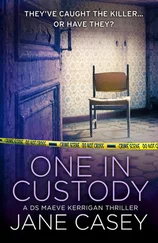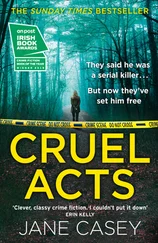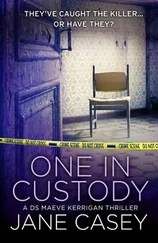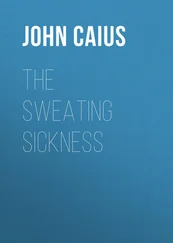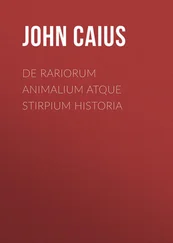
T hey pulled up to the wharf. Charlie helped Miss Perry out, and they went on up to the house. Dick and Tom started gutting and filleting the flounder, tossing the heads into a bait barrel, the stomachs into the creek, where green crabs danced out to snatch them. He stripped the meat from the sea-robin tail and tossed it in with the flounder.
He carried the bucket of fillets up the path and into the kitchen. May put the skillet on the burner.
Dick got himself a beer, looked around for Elsie to see if she wanted one. He went out onto the kitchen porch. He didn’t see Elsie or Tom. He called out. No answer. He looked down the path to the boat shed, only the front of which was visible among the trees. He’d built the shed when he first started work on the boat. It was huge and looked like hell — all it was was a framework of wood. The sides and the peaked roof were covered with heavy-gauge translucent vinyl which he’d fastened by nailing strips of lathing to the struts. There was no door, just curtains of old tarps he’d tied together. Once the weather had got warm, he’d torn away some of the siding to let the breeze in.
He’d built it so he could keep his tools and lumber dry. He’d also built it so he could keep people from seeing what he was up to. He’d told the boys not to let anyone near it. He marched over to the front flap and pulled it back.
Elsie was just inside, under the prow, her back to him. Tom was off to one side, turned his head to look at Dick. He stepped back, opened his mouth, but didn’t say anything.
Dick said, “Goddamn it, Tom.…”
Elsie turned and put her hand on his arm. “My God, Dick,” she said, “this is beautiful. It is absolutely beautiful.”
“Tom,” Dick said.
“I told her,” Tom said, “but she just came on in.”
“Dick, this is just amazing. I’ve never seen anything like it.” Elsie stretched her arms wide and ran her hands up either side of the sharp bow. “I’ve never seen a boat from this angle. I mean, such a big boat.” She tilted her head back to look up at the prow. “It’s so …” She broke off and walked around one side, trailing her hand along a seam. “It’s like a sculpture. A real work of art.” She looked at her palm, which was streaked with powdery red lead. She rubbed it on the seat of her shorts.
Tom slipped by Dick and out the front.
Elsie backed away from the side, pointed at the bow, and traced the line of the gunwale in the air. “And the way it slopes back on top too. I can see why boats are she.” She laughed. “It sounds silly but it is just … so … sexy.” She put her hands on her hips. “And the way the bow is so sharp and then fills out.”
Dick said, “She’s a workboat. She has to be sharp into the water but then carry a load. That’s always the problem with boats—”
Dick was startled to hear May speak up behind him. “Don’t start in on all that now. Supper’s ready.”
Elsie said, “I love the color too. Don’t you, May? That sort of rose color.”
Dick said, “That’s just an undercoat to keep the wood from taking on moisture.”
May sighed and stepped outside. Dick held the tarp for Elsie.
Dick said to Elsie, “I’ll be obliged if you don’t say anything about the boat.”
“Oh. All right. When will she be ready?”
May, walking ahead, gave a short laugh.
Dick said, “When I get finished.” He said to May, “You pick some tomatoes?”
May said, “It’s all on the table.” She stopped and said to Elsie, “That boat may look like a work of art to you. For us she’s a hole in outer space.”
“What do you know about holes in outer space?” Dick said. “Star Wars?”
“You mean a black hole?” Elsie said.
“You could call her that,” May said, “Miss Black Hole.”
“That’ll do,” Dick said. “It’s been hard but it ain’t that hard. No reason we can’t eat a good meal this evening. You show Elsie where she can wash up.”
Dick turned on the back stoop after they’d gone in. He wasn’t as mad at May as he’d thought he would be.
He’d felt a real storm coming up in him, but it had moved through without breaking. He was hurt, though. He looked at the dusty backyard, torn up by the pickup going to and fro. The kitchen garden. The line of the treetops, dark green against the evening sky, like heavy seas from the cockpit of a small boat.
He would run the boys and May to the movie house in Wakefield on his way to see Parker at the Neptune. Pick them up on the way home.
The boat shed, with its torn sides, its pale sagging roof, looked like a scorched, cracked eggshell thrown out in the trash.
Through the screen door he could hear Charlie showing his collection of shells and fish skeletons to Miss Perry. Charlie had mounted them so the jaws worked. Tautog. Squeateague. Indian names. Names left over like bones. From half a mile away Dick heard the trucks leaving the building sites on Sawtooth Point. Narragansett. Matunuck. Words from before anyone had owned anything.
He thought, I’ll get Joxer to take a look at the boat. Joxer said he’d come look. Then I’ll tell May that one way or the other I’ll have the boat out of here by Labor Day.
At supper Dick asked Miss Perry if the Narragansetts had really not owned land.
Miss Perry said they hadn’t owned land individually; as tribes they’d had dominion over tribal lands.
“Then how come they had wampum? What did they buy?”
“Ah,” Miss Perry said. “The chief use of wampum wasn’t as money. A piece of shell embroidery, that is, wampum, was a symbolic depiction of events. It could be used as a chronicle within the tribe. Or it could be sent from one tribe to another to call a council, and then each side would make another bit of shell work recording the treaty, and the tribes would exchange them. The fact that wampum was exchanged may have led the English settlers to think it served as money. Commerce was, after all, very much on the minds of our ancestors. I think Everett told me that wampum as money may have been an English invention, like scalping, which the red Indians then adopted. Wampum is quite beautiful. Everett had a piece. It was made of the purple insides of quahog shells and pieces of porcupine quill, all strung into a mosaic. It had a meaning, which we can’t decipher, but the design is a real work of art.”
Dick thought of Parker. Indians were nonplayers. Elsie said the boat was “a real work of art.” Where did that leave him? Were he and the rest of the swamp Yankees going to leave a name or two — Pierce Creek — and a relic or two — the silted-over causeway — and fade out? Get half remembered by bookish spinsters?
May brought in the first cake. She’d written “Charlie” in the middle. Around the name there were so many candles some of them were set at an angle, like pine trees growing out of a cliff. Miss Perry started them singing.
May, Miss Perry, and Elsie beamed at Charlie. Charlie sat up and puffed out his chest to blow out the candles. Dick felt a rush of irritation at Charlie that surprised him and embarrassed him. Not Charlie, anyone but Charlie, at least he’d been good with Charlie.
Charlie wasn’t going to be a fisherman, he wasn’t going to end up on the boat. Dick saw that. Dick knew he could talk him into it for a while, but Charlie had something else in him. Dick couldn’t say what, but it shone in him from time to time. Dick was glad for it, but felt the separation already.
And there was May, sour about something, not just the boat, though calling it a black hole was as far as May’d ever gone in that direction. Elsie calling the boat a real work of art — she might have a job, but what a rich-kid thing to say. Even Miss Perry’s queer old goodness shifted away from him, was once again just a reminder of how things had been when Sawtooth Point had been a hayfield, the Wedding Cake the product of the Pierce family’s farming and fishing.
Читать дальше
